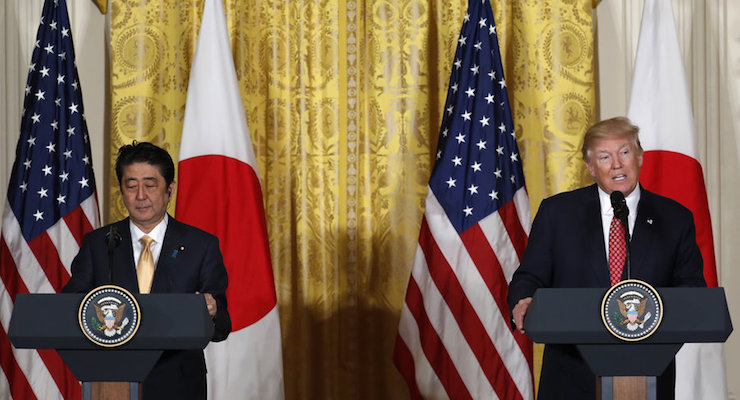

Japanese Prime Minister Shinzō Abe, left, looks on as U.S. President Donald J. Trump, right, speaks during a joint press conference at the White House in Washington, U.S., February 10, 2017.
When I warn about the fiscal and economic consequences of America’s poorly designed entitlement programs (as well as the impact of demographic changes), I regularly suggest that the United States is on a path to become Greece.
Because of Greece’s horrible economy, this link has obvious rhetorical appeal.
But there’s another nation that may be a more accurate “role model” of America’s future. This other country, like the United States, is big, relatively rich, and has its own currency.
For these and other reasons, in an article for The Hill, I suggest that Japan is the nation that may offer the most relevant warning signs. I explain first that Japan shows the failure of Keynesian economics.
…ever since a property bubble burst in the late 1980s, Japan’s economy has been in the doldrums, and its politicians deserve much of the blame. They’ve engaged in repeated binges of so-called Keynesian stimulus. But running up the national credit card hasn’t worked any better in Japan than it did for President Barack Obama. Instead of economic rejuvenation, Japan is now saddled with record levels of debt.
In other words, Japan already is a basket case and may be the next Greece. And all this foolish policy has been cheered on by the IMF.
I then highlight how Japan shows why a value-added tax is a huge mistake.
Japan’s politicians also decided to impose a value-added tax (VAT) on the nation. As so often happens when a VAT gets adopted, it turns into a money machine, as legislators start ratcheting the rate higher and higher. That happened in Europe back in the 1960s and 1970s, and it’s happening in Japan today.
And regular readers know my paranoid fear of the VAT taking hold in the United States.
But here’s the main lesson in the column.
[social-media-buttons]
The combination of demographic changes and redistribution programs is a recipe for fiscal crisis.
…the biggest economic threat to the country is the way Japan’s welfare state interacts with demographic changes. It’s not that the welfare state is enormous, particularly compared with European nations, but the system is becoming an ever-increasing burden because the Japanese people are living longer and having fewer children. …America faces some of the same problems. …if we don’t reform our entitlement programs, it’s just a matter of time before we also have a fiscal crisis.
To be sure, as I note in the article, Japan’s demographic outlook is worse. And that nation’s hostility to any immigration (even from high-skilled people) means that Japan can’t compensate (as America has to some degree) for low birth rates by expanding its population.
Indeed, the demographic situation in Japan is so grim that social scientists have actually estimated the date on which the Japanese people become extinct.
Mark August 16, 3766 on your calendar. According to…researchers at Tohoku University, that’s the date Japan’s population will dwindle to one. For 25 years, the country has had falling fertility rates, coinciding with widespread aging. The worrisome trend has now reached a critical mass known as a “demographic time bomb.” When that happens, a vicious cycle of low spending and low fertility can cause entire generations to shrink — or disappear completely.
Though I guess none of us will know whether this prediction is true unless we live another 1750 years. But it doesn’t matter if the estimate is perfect. Japan’s demographic outlook is very grim.
By the way, the problem of aging populations and misguided entitlements exists in almost every developed nation.
But I mentioned in the article for The Hill that there are two exceptions. Hong Kong and Singapore have extremely low birthrates and aging populations. But neither jurisdiction faces a fiscal crisis for the simple reason that people largely are responsible for saving for their own retirement.
And that, of course, is the main lesson. The United States desperately needs genuine entitlement reform. While I’m not overflowing with optimism about Trump’s view on these issues, hope springs eternal.
[social-media-buttons]





